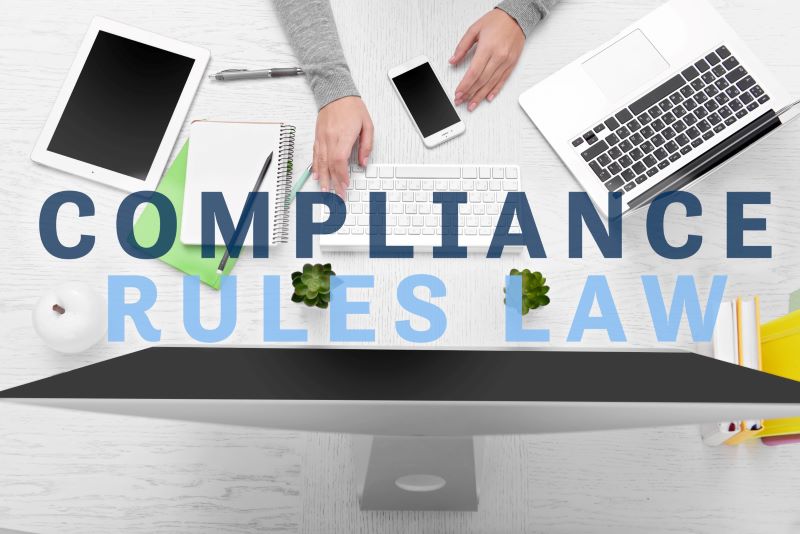2 min read
Tech Systems v. United States: COFC Upholds Army’s LPTA Award to Westech
Tech Systems, Inc. challenged a contract award issued by the Army Contracting Command–Rock Island for logistics...
Businesses are constantly bombarded by a complex and confusing array of overlapping statutory and regulatory mandates. The mandates come from several sources including statutes, regulations issued by the administrative agencies that are tasked with enforcement and courts issuing decisions interpreting the statutes and the regulations. Regulatory mandates may even come from private organizations such as where industry certifications or accreditations are needed.
The complexity is magnified by the fact that regulatory regimes overlap both vertically and horizontally. Vertically, in a given public policy area, regulations may exist at the city, county, state, federal, and international levels. Horizontally, a given aspect of a business or project may be governed by several regulatory regimes.
Hiring employees is a well-known example of this overlapping dimensional complexity. Vertically, employers must comply with various labor statutes and regulations issued by city, county, state, and federal authorities. If the business operates in multiple jurisdictions, then there may be multiple (and conflicting) city, county, and state regulations. Horizontally, hiring employees brushes up against regulations in adjacent policy areas. Since income tax and other taxes must be paid, employers must comply with various taxing regulatory mandates. Immigration laws are also implicated. Health and safety laws and regulations are triggered along with mandates related to workers compensation. Privacy and data security regulations are also in play with respect to the employment relationship. Each area of law has its own set of compliance requirements. Compliance is made even more difficult by the fact that, in any given year, lawmakers, administrators and courts are updating and modifying the regulations and new mandates are being driven by new technologies, changing public sentiments, pressure by advocacy groups and political partisanship.
Size does not matter. While many federal regulatory mandates apply only to "big" businesses, local and state regulations often apply to every business regardless of size. Further, the size limitation for the applicability of federal regulations is often only 50 employees. That is not a "big" business; 50 employees is a low threshold.

Regulatory compliance law is about protecting your business legally and financially by ensuring that your business follows all the mandates. Compliance is also about efficiency and about positioning your business to expand and enter new markets.
Regulatory compliance can be nearly impossible to manage without the legal advice and counsel of experienced regulatory compliance attorneys. There are too many moving pieces and the risks are too high. Whitcomb, Selinsky, PC, has a team of experienced and tested attorneys that can provide legal services with respect to many regulatory policy areas. We have experience working with many regulatory agencies. Our areas of experience include, but are not limited to:
Whitcomb, Selinsky, PC, has offices in Colorado and Virginia (near Washington) and we routinely assist clients in regulatory matters outside of those states.

Being out of compliance can subject a business to significant administrative fines and government-ordered closures, potential adverse civil judgments, reputational injuries, and even criminal penalties. In this age of instant news and social media, some forms of regulatory noncompliance, such violating environmental standards, can weaken stock prices, threaten business valuations, and can lead to consumer flight and the attendant loss of revenues and profits.
Government regulations can be a significant cost of doing business, but it is a mistake to think that profits can be enhanced by skimping on compliance. Given the potential costs of failing to be in compliance, staying current with regulatory compliance is ultimately financially cost-efficient.
Moreover, staying current with regulatory compliance can actually be value additive by making a business attractive to new customers, by making a business available to new customers who require regulatory compliance, by reducing some costs such as insurance coverage maintenance and by reducing the barriers to entry into new markets. For example, assume your business is in the oil and natural gas production industry and wants to expand to a new state. If your business is currently in compliance with existing regulations for your existing markets, likely, you may already be in compliance -- or nearly so -- with the regulations in the new market. This is possible because regulatory regimes in any given public policy area are often broadly similar from one jurisdiction to another. Thus, compliance under one regime may mean compliance under similar regimes. In this manner, compliance positions your business to expand.
Furthermore, demonstrated compliance may be necessary for acquiring certain insurance products without which a business may not be able to operate. At minimum, compliance can significantly reduce the cost of acquiring and maintaining these and other products.

In a similar manner, being in current compliance can reduce financial risks and staffing stresses associated with new regulations and regulatory changes.
Complying with environmental regulations provides a good illustration. For several decades now, environmental impact reports have been routinely required for various land use and other projects. Because of the statutory, administrative and court-imposed rules, most businesses in the industry have put in place the "compliance machinery" for efficiently obtaining the impact reports. The "compliance machinery" includes the established and implemented company policies and procedures, trained compliance staff, experienced compliance legal support, and up-to-date lists of experts, vendors and others to provide the technical support and specific expertise. This compliance machinery makes it relatively easy to comply with new regulations. If a new environmental impact regulation is imposed -- such as a study of the a land-use project's impact on ambient light -- adding a new section to the environmental impact report can be done relatively quickly with minimal costs and without unduly stressing compliance staff.
Data and information security is another good example. Consider contractors for the US Department of Defense ("DoD"). The DoD recently issued detailed regulations with respect to preventing hacking, data loss and exfiltration. Cybersecurity has become a "hot button" legal issue in the last several years. DoD contractors must now obtain a cybersecurity certification as a prerequisite to obtaining and maintaining DoD contracts. The new regulations created a substantial expense for some contractors. However, many contractors were already in compliance -- or nearly in compliance -- because they had already complied with various state and court-mandated cybersecurity regulatory regimes. For those contractors, coming into compliance with the new DoD cybersecurity regime did not result in excessive cost or the need for new staffing. Note that this is also an example where being in compliance makes a business available to a set of customers that have compliance as a requirement for their business partners.

Our experienced regulatory compliance attorneys provide legal assistance in various ways. For example, to ensure that clients are in compliance, we delineate and detail what the regulations mandate based on our extensive knowledge of statutes, regulations and case law. Just as importantly, we provide advice and counsel on how businesses can comply. Sometimes the statute or regulation provides a template that must be used. An example might be the content of an anti-discrimination training program. Other times, specific guidance on how to comply is provided by a court decision. Our regulatory compliance attorneys can puzzle out what a court decision means at a practical level.
Our attorneys also help with the following:
Contact an Experienced Regulatory Compliance Attorney in Colorado and Virginia
If you need assistance with any sort of regulatory compliance issue, our aggressive and experienced attorneys can help. Whitcomb, Selinsky, PC has years of experience representing a wide variety of clients in regulatory matters including individuals, landowners, not-for-profit organizations, service veterans, small businesses, large multi-state and multinational corporations, mining and drilling operations, land developers and manufacturers. We have teams that can provide the experience, advice and guidance that you need. Contact us today by calling (866) 476-4558 (toll-free) or (303) 534-1958 or through our online contact page. We have offices in Denver, Colorado and in Herndon, Virginia.

Lawyers craft a comprehensive regulatory compliance strategy, incorporating several pivotal elements. This strategy hinges on the engagement, backing, and accountability from the company's senior leadership, ensuring that compliance oversight is in the hands of top executives. It's essential for the program to be woven into the fabric of the company's culture and be customized to suit the specific sector of the client. Effective communication and robust training programs are indispensable, alongside a reliable reporting mechanism. The strategy demands ongoing surveillance, regular audits, and thorough evaluations, coupled with appropriate actions in response to any infractions. Implementing incentives, establishing disciplinary actions, and facilitating corrective measures are also crucial aspects of Antitrust Compliance: Crafting Policies and Procedures.
Another vital element is a compliance handbook or guidelines that make management and staff aware of the potential risks linked to their operations. An educational initiative that fosters awareness of antitrust issues among managers and staff is fundamental § 107A.01 Introduction, § 5.01 Introduction, § 8.01 Introduction. The framework should also encompass a designated compliance officer, a systematic reporting channel, antitrust audits, recurring evaluations for the program's efficacy, and thorough record-keeping of transactions that could have antitrust consequences § 5.01 Introduction, § 8.01 Introduction.
In certain situations, the compliance framework might also feature a method for generating immediate records of transactions that bear antitrust significance. This could be instrumental in halting any future antitrust probes or legal challenges § 107A.01 Introduction.
When dealing with the Foreign Corrupt Practices Act (FCPA), the compliance agenda should include an explicit policy declaration, detailed compliance protocols, an exhaustive training regimen, regular risk analyses, diligent oversight and supervision, commitment to enforcement and transparency, with an emphasis on leadership and corporate ethos Foreign Corrupt Practices Act Compliance Programs Checklist.
To top it off, the compliance initiative should be overseen by a compliance officer who reports directly to the CEO and consistently communicates with the board of directors or a relevant committee thereof § 1239.12 Compliance program.
Lawyers craft a comprehensive regulatory compliance framework with essential elements at its core. This framework emphasizes the pivotal role of top-tier management in leading, supporting, and being accountable for compliance efforts, assigning them the oversight responsibilities within the organization. It's imperative that this framework is woven into the fabric of the company's culture and tailored specifically to the industry needs of each client. Effective communication and rigorous training programs are indispensable, alongside a robust reporting mechanism. The framework demands ongoing surveillance, audits, and evaluations to address any infractions promptly. Equally important are the mechanisms for incentives, disciplinary actions, and corrective measures to ensure Antitrust Compliance and the drafting of effective policies and procedures.
Another critical element is a compliance handbook or guidelines designed to make management and employees aware of the potential risks inherent in their operational activities. Through an educational initiative, this program cultivates an awareness of antitrust concerns among managers and staff. This includes establishing a role for a compliance officer, setting up a systematic reporting channel, conducting antitrust audits, periodically reviewing the program's effectiveness, and maintaining records of transactions that could have antitrust consequences.
In certain instances, the compliance strategy might also encompass a method for generating real-time records of transactions that bear antitrust significance. Such records are invaluable for curtailing any future antitrust inquiries or legal challenges.
When addressing the specifics of the Foreign Corrupt Practices Act (FCPA), the compliance initiative should articulate a clear policy declaration, detailed compliance methodologies, an exhaustive training regimen, regular risk evaluations, as well as consistent oversight and monitoring. It should also prioritize enforcement, voluntary disclosure, and underscore the significance of leadership and organizational culture in its Foreign Corrupt Practices Act Compliance Programs Checklist.
To round off, the compliance initiative must be led by a dedicated compliance officer who has a direct reporting line to the chief executive officer and provides regular updates to the board of directors or a designated committee, ensuring governance and oversight are maintained at the highest level.
Regulatory compliance lawyers are integral to the processes of contract scrutiny and creation. They oversee trademark management, offer guidance on intellectual property concerns, handle litigation, review contractual agreements, and ensure adherence to both federal and state legal requirements. Additionally, they play a key role in the formation of contracts, working with terms that have been pre-negotiated by company leadership and sales personnel, as illustrated in the case CytoSport, Inc. v. Vital Pharms., Inc., 2010 U.S. Dist. LEXIS 24637.
When it comes to reviewing contracts, these attorneys assist executives in evaluating potential contractual hazards and in negotiating amendments. They verify the provision of all pertinent documents by the client and ensure these documents' critical terms are accurately reflected in the contract. They also make certain that company leaders have a clear understanding of the agreements proposed by the opposing party, as detailed in § 5.02 The Review of Contracts.
During the contract drafting phase, they acquaint themselves with the applicable legal statutes to the deal to sidestep any omissions or legal traps. For particularly complex sectors such as tax law and antitrust, they might enlist the expertise of specialized in-house or external counsel as outlined in § 5.01 The Preparation of Contracts.
Moreover, their responsibilities may extend to overseeing a cadre of contract attorneys dedicated to document examination. They compile a briefing memo that lays out the case background and provides explicit directives for the reviewing attorneys. Following the initial review by these contract attorneys, they perform a meticulous second-level examination of the electronic documents, as per the Document Review Checklist (Federal).
It's crucial to recognize that engaging contract attorneys for extensive document analysis is a widely accepted and effective strategy within the legal field, a practice underscored by the case C.K. v. Bassett, 2023 U.S. Dist. LEXIS 106566.
Violating U.S. Federal law's regulatory compliance standards can lead to severe outcomes, encompassing both damage to reputation and hefty financial repercussions, as outlined in the OFAC Violation Responses. The gravity of the accused misconduct significantly impacts the nature of the charges brought forward. For example, accusations of fraud are taken more seriously than breaches related to the Exchange Act's reporting, internal control, and bookkeeping mandates. The specific legal provisions claimed to be breached also shape the SEC's preferred settlement remedy. In certain scenarios, a firm may forfeit its eligibility for the safe harbor provision related to forward-looking statements if it finds itself under a judicial or administrative mandate to halt any breaches against the securities laws' anti-fraud measures. Moreover, the accused party may need to persistently report any orders tied to anti-fraud or reporting breaches — but not those related to internal controls or bookkeeping — in official filings like registration and proxy statements. Numerous publicly traded companies, with their web of licenses, loan agreements, partnerships, and government contracts, could see these aspects of their operations impacted by an SEC settlement, as highlighted in § 17.05 Factors in Negotiations. When it comes to OFAC sanctions, even the most well-prepared companies with robust compliance frameworks can stumble into violations, which brings about grave reputational and financial fallout, as detailed in the OFAC Violation Response Checklist. The threat of an OFAC breach is omnipresent across all insurance sectors, making a well-conceived response to any potential violation imperative, as seen in the OFAC Compliance in the Insurance Industry Checklist. Finally, succumbing to regulatory violation enforcement actions exposes a company to the risks of both criminal and civil liabilities, not to mention the possibility of suspension or debarment from federal contracting opportunities. This situation poses a significant threat to the operational survival of numerous firms within the sector, as captured in § 12.02 The Regulatory Trap.

As the firm’s leader, Joe manages, directs, consults, and acts as an advisor to his practice group leaders Joe’s areas of specialty include government procurement and international business transactions.

Along with leading the Government Contracting practice area, Tim manages labor and employment cases for the firm. He centers his practice in the Health and Safety sector, defending clients against MSHA and OSHA regulatory enforcement actions.

Dilyn spent 14 years as a Staff Officer with the United States Department of Defense. She has extensive experience with investigations involving the Department of Defense, Department of Justice, United States Federal Bureau of Investigations, Department of Commerce, and Department of State. Dilyn brings a wealth of experience in trade law, trade compliance, and government and defense contracting.

With more than 35 years of professional legal experience, Anne brings a broad range of knowledge on intellectual property (IP), government contracts, and patent law. She knows the intricacies of federal procurement actions, from requesting proposals and evaluating offers/bids from contractors to administering contracts and negotiating dispute settlements with contractors, giving her a unique insight into the government contracts world.

Jon counsels and represents government contractors in healthcare, construction, manufacturing, defense, information technology, and service industries. He specializes in representation in both pre-contract and contract-administration phases.

Josh helps clients successfully navigate the complex and ever-changing landscape of government contracting. He advises clients on compliance with government regulations, helps them navigate the contracting process, and negotiates contracts. Additionally, he represents clients in disputes, such as bid protests, claims, and appeals.
Get Started in
 Discuss Your Claim
Discuss Your Claim  Explore Your Options
Explore Your Options  We Will Advocate For You
We Will Advocate For You


Tech Systems, Inc. challenged a contract award issued by the Army Contracting Command–Rock Island for logistics...
AirBoss Defense Group, LLC, a supplier of personal protective equipment, challenged a procurement conducted by the...
In 2019, the Department of Defense (DoD), through the Defense Health Agency (DHA), issued a solicitation for...
Colorado
300 Union Boulevard
Suite 200
Lakewood, CO 80228
(303) 534-1958 (local)
© 2026 · All Rights Reserved · Whitcomb, Selinsky, PC